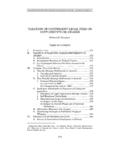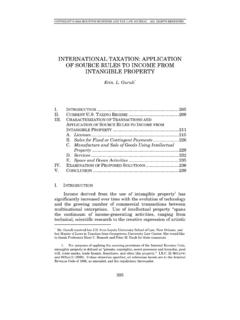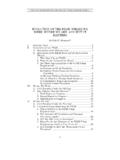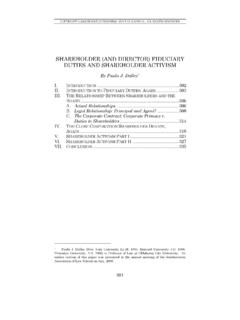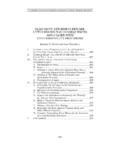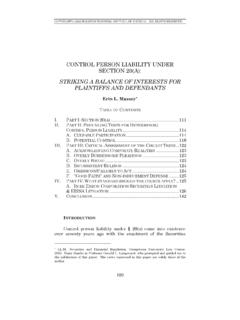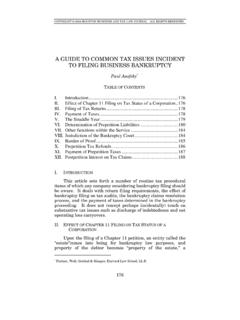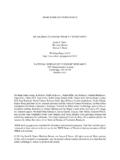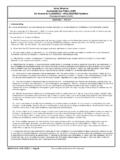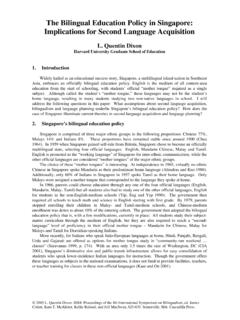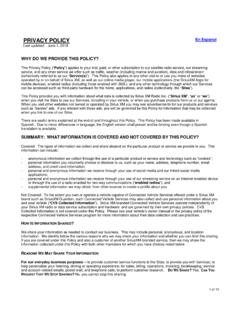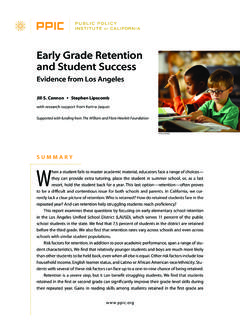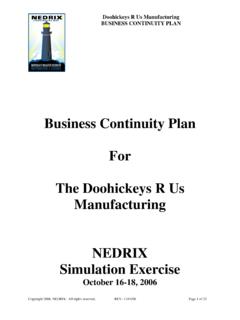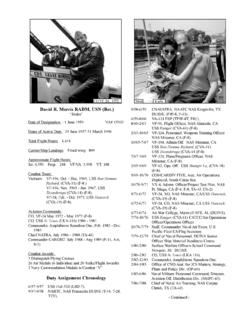Transcription of GEOFFREY V. COMMISSIONER: THE FALL OF “TOYS R US” …
1 COPYRIGHT 2010 HOUSTON BUSINESS AND TAX LAW JOURNAL. ALL RIGHTS RESERVED 340 GEOFFREY V. COMMISSIONER: THE fall OF toys R US AND THE RISE OF TAX R US Vivian Lei* I. BACKGROUND .. 342 A. Quill v. North Dakota the Supreme Court s Take on the Due Process Clause and the Commerce 342 B. Capital One v. Commissioner the Massachusetts Court s Take on Use Tax and Income-Based Tax .. 344 C. Massachusetts Corporate Income Tax .. 345 II. GEOFFREY V. COMMISSIONER .. 347 A. The Facts .. 347 B. The Opinion .. 348 III. A CRITIQUE OF GEOFFREY .. 349 A. Capital One s Leap from Quill .. 349 B. GEOFFREY s Leap from Capital One .. 355 C. Not All States Agree with GEOFFREY , and Those that Do Agree with GEOFFREY Are Factually Distinguishable .. 355 D. Policy Arguments for Quill s Physical Presence Test .. 360 IV. CONCLUSIONS .. 362 * Associate in Patent Litigation, Morrison & Foerster LLP, Palo Alto, California.
2 This Article does not represent the views of her firm or its clients. This Article originated from a paper for a seminar taught by Adjunct Professor David Brunori, who provided helpful guidance throughout many earlier drafts. The author would like to thank her parents, Cindy Ho and Vei-Chyau Lei, for having provided her with so many opportunities to reach for the stars. COPYRIGHT 2010 HOUSTON BUSINESS AND TAX LAW JOURNAL. ALL RIGHTS RESERVED 2010] THE RISE OF TAX R US 341 Corporate entities, like individual taxpayers, strive to minimize their tax exposure. To that extent, those with intangible properties, such as trade secrets, copyrights, patents, and trademarks, often incorporate a subsidiary in a state that does not tax royalty income generated by licensing These corporations then transfer ownership of intangibles to those subsidiaries ( intangible-holding company or IHC ) whose sole business is to license the transferred intangibles to other affiliates across the While the parent corporations must still pay tax on their income in their forum states,3 the IHC s income which consists only of licensing royalties would not be taxed by the IHC s forum state under this But states other than an IHC s forum state are also interested in taxing the IHC s royalty income.
3 Indeed, many states have aggressively pursued through their court system s efforts to tax a non-domiciliary ( foreign ) IHC s income. And about a dozen of them5 have succeeded. Imposing tax on a foreign corporation whose only link with the state is the presence of its intangible property presents serious constitutional issues. Under the Due Process Clause6 and the Commerce Clause7 of the United States Constitution, a state is prohibited from imposing its tax jurisdiction upon a foreign corporation which does not have sufficient involvement with the And, when links with the state entails only the presence of its intangible property, the question of whether a 1. Delaware is one such state. Del. Code Ann. tit. 30, 1902(b)(8) (no tax on the income of a business whose only activity in the state is the ownership, maintenance, and management of intangible property).
4 Michigan is another one such state. See Kmart Props., Inc. v. Taxation & Revenue Dep t, 131 27, 31 ( Ct. App. 2001) ( Michigan .. does not tax income from royalty payments. ). 2. See generally James A. Amdur, State Income Tax Treatment of Intangible Holding Companies, 11 6th 543 (2006) (describing court holdings that preclude states from taxing IHC s income under due process and commerce clause concerns). 3. Note that a corporate entity s forum state is the state in which the corporate entity is incorporated, domiciled, and whose law under which the corporation is organized and protected. See CHARLES W. SWENSON ET AL., STATE AND LOCAL TAXATION: PRINCIPLES AND PLANNING 50-51 (2nd ed. 2003). 4. See Amdur, supra note 2, at 552-53. 5. Arkansas, Florida, Indiana, Iowa, Louisiana, Massachusetts, New Jersey, New Mexico, North Carolina, Oregon, and Wisconsin.
5 See BNA Tax Management Portfolios, Limitations on States Jurisdiction to Impose Net Income Based Taxes, TMSTATEPORT No. 1410 03. 6. CONST. amend. XIV, 1 ( [N]o State shall .. deprive any person of life, liberty, or property, without due process of law. ). 7. CONST. art. 1, 8, cl. 3 (authorizing Congress to regulate Commerce .. among the several States ). 8. See, , Miller Bros. Co. v. Maryland, 347 340, 344, 347 (1954); Complete Auto Transit, Inc. v. Brady, 430 274, 279 (1977), reh. denied 430 976. COPYRIGHT 2010 HOUSTON BUSINESS AND TAX LAW JOURNAL. ALL RIGHTS RESERVED 342 HOUSTON BUSINESS AND TAX LAW JOURNAL [Vol. X foreign corporation has the constitutionally requisite involvement with the taxing state for tax purposes becomes even more difficult. Part I of this Note provides background on two cases: Quill v.]
6 North Dakota, the Supreme Court case discussing the stringent requirements of the Commerce Clause (as compared to the Due Process Clause) and Capital One v. Commissioner, the Massachusetts case that distinguished Quill on the basis of the tax at issue and the main case on which the subject case of this Note relied. Finally, this Part also provides background on Massachusetts law on corporate income tax. Part II lays out the facts and the opinion of GEOFFREY v. Commissioner. GEOFFREY brings to question the constitutionality of Massachusetts imposition of corporate income tax on a foreign corporation whose only connection with the commonwealth is the presence of its intangible property. Part III of this Note provides a critique of GEOFFREY . Specifically, the note argues that Capital One took leaps from Quill and other Supreme Court precedents, and that GEOFFREY , in turn, took further leaps from Capital One.
7 This Part also looks at other state court decisions and concludes that not all states agree with GEOFFREY , and those that do agree with GEOFFREY are factually distinguishable. Finally, policy arguments are made in this Part for insisting on Quill s physical presence test. Part IV concludes this Note. I. BACKGROUND A. Quill v. North Dakota the Supreme Court s Take on the Due Process Clause and the Commerce Clause Constitutional issues relating to a state s authority to tax a foreign corporation arise under the Due Process Clause and the Commerce Clause. In order to pass constitutional muster, a state must show that its tax on foreign corporations meets the requirements of both clauses. While both the Due Process Clause and the Commerce Clause have been invoked by courts to deny a state the right to tax a foreign corporation, they are analytically distinct.
8 9 On the 9. Quill Corp. v. North Dakota, 504 298, 305 (1992). See id. at 312 ( Due process centrally concerns the fundamental fairness of governmental activity. Thus, .. the due process nexus analysis requires that we ask whether an individual s connections with a State are substantial enough to legitimate the State s exercise of power over him .. In contrast, the Commerce Clause and its nexus requirement are informed not so COPYRIGHT 2010 HOUSTON BUSINESS AND TAX LAW JOURNAL. ALL RIGHTS RESERVED 2010] THE RISE OF TAX R US 343 one hand, the Due Process Clause limits a state s authority to assert tax jurisdiction10 by requiring a minimum connection between the taxing state and the entity it seeks to On the other hand, the Commerce Clause, as the Supreme Court stipulated in Complete Auto v.)
9 Brady, bars state regulations that unduly burden interstate commerce 12 by requiring any tax imposed on foreign corporations to be applied to an activity with a substantial nexus with the taxing State, fairly apportioned, not discriminat[ory] against interstate commerce, and fairly related to the services provided by the State. 13 In the landmark case of Quill v. North Dakota, the United States Supreme Court made it clear that the substantial nexus requirement of the Commerce Clause presents a much higher hurdle for a taxing state to overcome than does the minimum connection requirement of the Due Process While the latter can be satisfied by, for example, the purposeful availment of a taxed entity to the benefits of the taxing state s economic market,15 the former cannot. In particular, Commerce Clause s substantial nexus requirement demands more than the mere economic presence of a taxed entity in the taxing state it requires physical presence of the By sticking with the bright-line rule requiring physical presence of taxed entities in the taxing state, Quill reaffirmed National Bellas Hess v.
10 Department of Revenue,17 a case the Supreme Court decided twenty-five years earlier. much by concerns about fairness for the individual defendant as by structural concerns about the effects of state regulation on the national economy. ). 10. This limitation does not derive from the specific language of the Due Process Clause itself; rather, it is a doctrine of judicial origin based on what is conceived to be an unstated but fundamental constitutional principle. BNA Tax Management Portfolios, Limitations on States Jurisdiction to Impose Net Income Based Taxes, TMSTATEPORT No. 1410 02. 11. Miller Bros. Co., 347 at 345. 12. Quill, 504 at 312. 13. Brady, 430 at 279. 14. Quill, 504 298 at 312. 15. Burger King Corp. v. Rudzewicz, 471 462, 472 (1985); see also Quill, 504 at 307-08 (affirming Burger King s holding).

